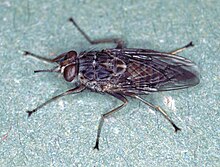Serap Aksoy
Serap Aksoy | |
|---|---|
| Born | 1955 (age 68–69) |
| Known for | tsetse flies |
| Academic background | |
| Education | BSc, Biology, 1978, Vassar College PhD, 1982, Columbia University |
| Thesis | Regulation of rRNA gene expression in Escherichia coli (1982) |
| Academic work | |
| Institutions | Yale School of Public Health |
Fatma Serap Aksoy (born in 1955) is a Turkish–American medical entomologist.
Early life and education[edit]
Aksoy was born in Fatih, Istanbul[1] in 1955.[2] After graduating from Robert College, she moved to the United States for her Bachelor of Science degree in biology from Vassar College. Following this, she earned a PhD in Biology from Columbia University and then completed a postdoctoral fellowship the Yale School of Public Health.[1]
Career[edit]

Following her post-doctoral fellowship, Aksoy joined the faculty at the Yale School of Public Health in 1988.[2] She was eventually promoted to full professor in 2001[1] and served as the department chair from 2002 to 2010.[2] As a full professor, Aksoy focused on studying the transmission of human African Trypanosomiasis. She was specifically interested in conducting studies to genetically alter tsetse flies so it would be unable to transmit the parasite to humans and livestock.[3] As part of this research, Aksoy also studied the genome in Sodalis, which was published in Massive genome erosion and functional adaptations provide insights into the symbiotic lifestyle of Sodalis glossinidius in the tsetse host.[4] In 2009, Aksoy was appointed editor in chief of the PLOS Neglected Tropical Diseases, after having served as the journal’s deputy editor.[3]
In 2014, Aksoy was a member of an international team of researchers that successfully sequenced the genetic code of the tsetse fly. This was a 10-year effort that began when Aksoy helped initiate the collaborative research project in the early 2000s.[5] Following the sequencing of the genetic code, Aksoy continued to research ways to improve control methods of infections and develop strategies to reduce or eliminate its transmission. As such, she received a Fulbright Scholarship to support her project "Innovative Methods for Control of Insect-Transmitted Diseases" in Italy.[6] Upon returning, Aksoy led a research team into examining an additional control strategy called para-transgenic expression to synthesize proteins that target trypanosomes in microbes cultivated from the gut of tsetse flies.[7] Aksoy was also one of four Yale female professors to be honored with Women of Innovation awards by the Connecticut Technology Council.[8] The following year, she was the first recipient of the Breakthroughs in Medical Entomology Award in recognition of her discoveries regarding the mammalian trypanosome surface proteins known as Variant Surface Glycoproteins (VSG). Her research team were the first to find why these proteins favored parasite infection transmission.[9]
As a result of her global efforts in reducing infection, Aksoy and Peter Salovey participated in a signing ceremony with the Kenya Agricultural Research and Livestock Organization and Kenya Wildlife Service in 2018 to continue their existing partnership. The renewed agreement also allowed for the transfer of tsetse fly parts to Yale for further research.[10] The following year, she was honored by the Connecticut Academy of Science and Engineering.[11] In 2021, Aksoy was elected a member of the National Academy of Sciences for her research into microbial diseases.[12]
References[edit]
- ^ a b c "A Conversation with Serap Aksoy". Turkish American Scientists and Scholars Association. 2015. Retrieved October 22, 2021.
- ^ a b c "Serap Aksoy, ESA Fellow (2015)". Entomological Society of America. Retrieved October 22, 2021.
- ^ a b Greenwood, Michael (October 9, 2009). "Aksoy Named Editor of Journal on Tropical Medicine". Yale University. Retrieved October 22, 2021.
- ^ Hidehiro, Toh; Weiss, Brian L.; Perkin, Sarah A. H.; Yamashita, Atsushi; Oshima, Kenshiro; Hattori, Masahira; Aksoy, Serap (February 2006). "Massive genome erosion and functional adaptations provide insights into the symbiotic lifestyle of Sodalis glossinidius in the tsetse host". Genome Research. 16 (2): 149–156. doi:10.1101/gr.4106106. PMC 1361709. PMID 16365377.
- ^ Greenwood, Michael (April 24, 2014). "A scourge of rural Africa, the tsetse fly is genetically deciphered". Yale University. Retrieved October 22, 2021.
- ^ "Serap Aksoy". Fulbright Program. Retrieved October 22, 2021.
- ^ Gaber, Adam (February 15, 2018). "Aksoy Labs combats the tsetse fly to protect Africa from sleeping sickness". Yale University. Retrieved October 22, 2021.
- ^ "Four Yale affiliates honored with 'Women of Innovation' awards". Yale University. February 26, 2015. Retrieved October 22, 2021.
- ^ "Aksoy wins the " Breakthrough in Medical Entomology Award"". Yale University. November 29, 2016. Retrieved October 22, 2021.
- ^ "Yale, Kenyan scientists renew collaboration on tsetse fly research". Yale University. March 16, 2018. Retrieved October 22, 2021.
- ^ "Yale faculty honored by Connecticut Academy of Science and Engineering". Yale University. February 20, 2019. Retrieved October 22, 2021.
- ^ "Four Yale professors elected to National Academy of Sciences". Yale University. April 27, 2021. Retrieved October 22, 2021.
External links[edit]
- Serap Aksoy publications indexed by Google Scholar
